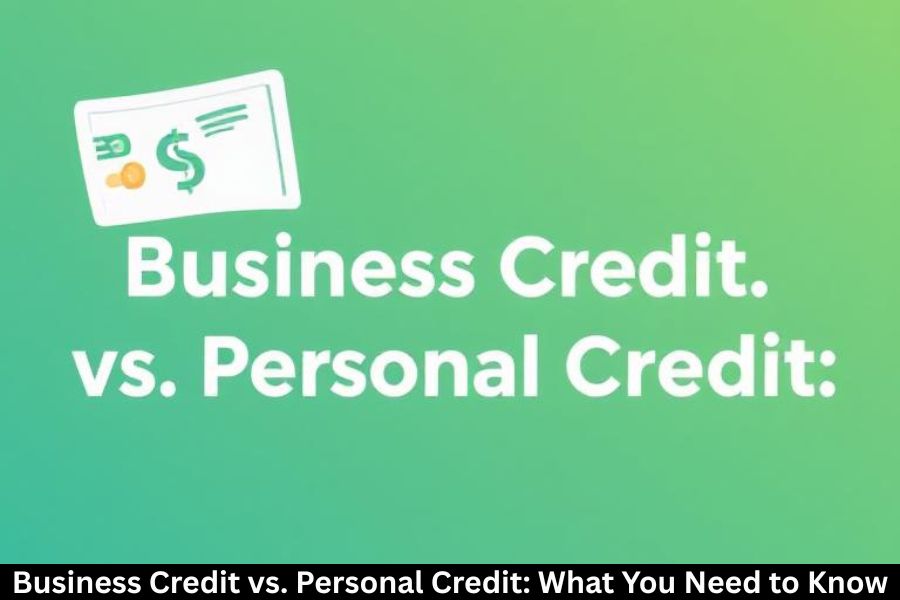If you operate a business or have an intention of doing so, you perhaps have heard of business credit. But while it might sound familiar, do you ever wonder exactly what it is? How does it differ from personal credit? And why should you care?
Let’s break that down with an injection of clear, jargon-free explanation. Know that this very distinction between business and personal credit may be the smartest financial move you make this year, whether you freelance, own a small business, or have a startup in scale-up mode.
What Is Personal Credit?
Personal credit refers to the financial reputation tied to you as an individual. It is tracked using your Social Security Number (SSN) and measures how well you handle debt such as credit cards, student loans, mortgages, or car loans.
FICO scores are commonly used for credit scores, which typically range from 300 to 850, thus scoring higher means better approval chances for loans on low interest rates.
What Is Business Credit?
Business credit, in contrast to personal credit, is credit that belongs to your company and is distinct from you personally. It uses your company’s EIN and reflects the responsible manner in which your company has handled its financial obligations.
Instead of the FICO score, different businesses have their business credit score from such bureaus as Dun & Bradstreet, Experian Business, and Equifax Business.
Differences between Business and Personal Credit
Broad level differences are:
1. Ownership & Responsibility
A credit record of a person.
Bankruptcy has become a recent term for businesses, for it is the credit record of those businesses.
2. Reporting Agencies
Actual agencies report personal credit: Equifax, TransUnion, and Experian.
Dun & Bradstreet, business Equifax, and business Experian are following business credit.
3. Limits
Business credit cards are usually offered with higher limits, as business expenses tend to be greater in value.
4. Privacy
Business credit reports are sometimes accessible to the public; personal credit reports are private.
Why Credit Checks for Business
You might be thinking, “Why not just use my personal credit for everything?”
Here is why that is a risk:
- It blurs the line between your business and personal finances.
- In case the business goes down, your personal credit does get hit.
- You restrict your potential to grow your business via outside funds.
On the other hand, if you build a solid business credit profile, it can carry you far:
- Getting credit with higher limits
- Obtaining superior terms for loans and lines of credit
Through better credit, understanding, and arrangements with vendors and suppliers.
How to Build Business Credit
Building business credit is not rocket science but a few intentional steps have to be undertaken:
1. Register Your Business
Create an LLC or corporation and get an EIN from the IRS.
2. Open a Business Bank Account
Make sure that your personal and business finances are separated at all costs.
3. Get a Business Credit Card
Use it wisely; pay on time and do not max out your credit limits.
4. Work with Vendors that Report Your Payments
Not all vendors report payments to the business credit bureaus; verify that they do.
5. Monitor Your Business Credit Report
Just like personal credit, errors can appear; so check it often and get them fixed.
Can Business Credit Affect Personal Credit?
Yes, only in certain cases.
If you personally guarantee a business loan or credit card, it can show up on your personal credit report. Also, if your business defaults and you have signed a personal guarantee, the lenders have the right to come after your personal assets.
This is why building business credit early is key so that in the long run, you do not need to fall back on personal guarantees.
Which One Should You Use — Business or Personal Credit?
Depends on the situation:
- Use personal credit for personal expenses and non-business-related borrowing.
- Use business credit for operational expenses, vendor payments, inventory, and other company costs.
Pro Tip: Mixing the two can create a tax and legal nightmare. Keep them separate!
Common Mistakes to Avoid
- Using personal cards for business purchases
- Not monitoring your business credit score
- Failing to register your business properly
- Missing payments to vendors
- Ignoring your credit utilization ratio
Conclusion
Business credit, in the world of commerce, is power. And knowing the distinction between personal credit and business credit helps you to avoid financial pitfalls, seek better funding, and sustain long-term success. Don’t wait until things are already rolling smoothly in business to start establishing credit for it; start laying that financial foundation today.
FAQs
1. Can I get a business credit card without business credit history?
Yes! Many issuers offer business credit cards based on your personal credit score to help you get started.
2. Does using my personal credit hurt my business?
It can. If your business goes into debt, it could damage your personal credit and put your assets at risk.
3. How long does it take to build business credit?
With the right steps, you can start seeing results in as little as 3–6 months.
4. Is an LLC required to build business credit?
Well, not required, but forming an LLC or corporation makes it easier to separate business and personal finances.
5. Where can I check my business credit score?
You can check through agencies like Dun & Bradstreet, Experian Business, and Equifax Business.




